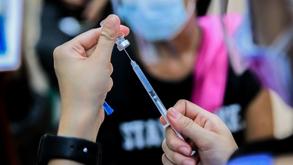 A health worker prepares a dose of Sinovac vaccine at a vaccination site in Manila, the Philippines on March 31, 2021. (PHOTO / XINHUA)
A health worker prepares a dose of Sinovac vaccine at a vaccination site in Manila, the Philippines on March 31, 2021. (PHOTO / XINHUA)
The Philippines is racing to get hold of more COVID-19 vaccines as it struggles with increasing infections of the highly transmissible Delta variant of the coronavirus. The surge in COVID-19 cases is also tipping some once-hesitant Filipinos in favor of vaccination.
The country, which was already battling the second-worst outbreak of the virus in Southeast Asia, reported its first locally transmitted infections of the Delta variant in mid-July, and has since confirmed more such cases.
As of Thursday, the country had detected 331 cases of the variant, according to the Philippines' Department of Health.
The government has ordered 164 million doses of vaccines, with more than 34 million of them having been delivered by Aug 2. Chinese-developed vaccines, which helped launch the Philippines' inoculation program in March, account for about 15 percent of the country's vaccine procurement.
ALSO READ: Philippines scrambles amid Delta cases to renew focus on jab supply
But President Rodrigo Duterte said in a briefing on Aug 2 that the country's vaccine supplies are insufficient.
Duterte said most vaccine doses have been administered to residents of the capital region of Metro Manila, given its huge population and the prevalence of local transmissions.
Metro Manila is home to 16 million. The Philippines has more than 1.6 million COVID-19 cases, of which more than 500,000 are in the capital region.
The Philippines has more than 1.6 million COVID-19 cases, of which more than 500,000 are in the capital region
Of the vaccines delivered, 20.8 million doses have been administered, according to Carlito Galvez Jr, the chief implementer of the National Task Force Against COVID-19. He said 9.1 million Filipinos have been fully vaccinated, equivalent to roughly 13 percent of the more than 70 million people that the government is aiming to vaccinate by the end of the year.
Rising death tolls
Lulu Bravo, executive director of the Philippine Foundation for Vaccination and chairperson of the National Adverse Events Following Immunization Committee, said more Filipinos are now willing to get vaccinated as they have seen how the pandemic has claimed thousands of lives.
"They're seeing that lots of people are dying," Bravo said, noting that this fear of death has neutralized the anti-vaccine sentiment that was prevalent in the Philippines during the early phase of the pandemic.
Bravo said controversy surrounding a dengue fever vaccine, Dengvaxia, four years ago had dented vaccine confidence among Filipinos.
But people's wariness has begun to ease as the pandemic worsens. A survey by Pulse Asia Research in June revealed that 43 percent of 2,400 respondents said they were willing to receive a COVID-19 shot. This was significantly higher compared with the result of a survey in February that showed that only 16 percent wanted to get vaccinated.
Still, some vaccine hesitancy exists among older people, said Galvez, noting that the pace of vaccinations for this priority group had barely moved in recent weeks. Only 2.8 million elderly Filipinos had been vaccinated by Aug 1.
Nina Castillo-Carandang, a professor at the University of the Philippines' College of Medicine, said it is the issue of accessibility that is keeping most seniors from getting immunized. It is difficult for many of them to book vaccination appointments as this is usually done online, the academic said.
Gene Nisperos, board member of the Manila-based nonprofit group Community Medicine Development Foundation, said the inadequate vaccine supply in the Philippines is "a symptom of a bigger problem, which is the poor handling of pandemic response".
The government needs to improve testing, contact tracing and bio surveillance, Nisperos said. This is especially crucial as the Delta variant spreads.
READ MORE: Philippines bars nurses from working abroad as cases surge
Contact the writer at prime@chinadailyapac.com


